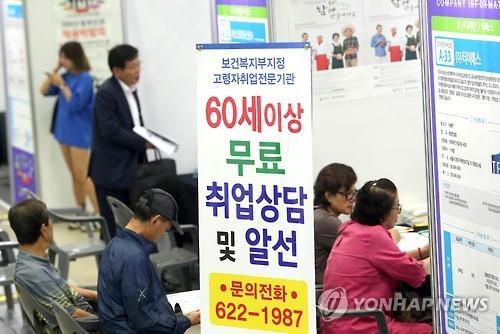The employment rate of Koreans in their late 50s and early 60s is far lower than that of its neighbor Japan due to a lack of policy measures to help them find jobs, a report said Tuesday.
As of 2015, the employment rate for Koreans aged 55 to 59 came to 70.6 percent, compared with 83.4 percent for Japan, according to the report by Hyundai Research Institute.
The rate for Korean citizens aged 60 to 64 stood at 59.4 percent, also lower than Japan's 62.2 percent. However, the figure for those aged 65 and older reached 30.6 percent for South Korea, trumping Japan's 21.7 percent.

Japan's high senior employment rate was attributed to its well-established policy system to support job searches by the elderly.
After introducing a law to tackle population aging in 1995, Tokyo started spending state funds on helping senior citizens land jobs in 1997, with the related budget growing at an annual average rate of 4.7 percent since. This year's budget stands at 7.69 billion yen ($75.4 million).
Starting in 2006, Japan also required companies to adopt one of three options for senior workers: abolishing the mandatory retirement system, extending the retirement age or allowing employees work as temps after retirement.
Lee Bu-hyung, an HRI economist, said the government should not only establish a detailed policy network to help boost the employment of seniors, but also come up with measures to ensure that increased senior employment will not lead to a drawdown in youth employment.
"An increase in senior employment is the most effective way to reduce the social burden ranging from medical care to welfare and pensions," he said.
As of this year, some 4.92 million people are aged 55 to 64 in Korea that has a total population of 50.62 million, according to government data.
In an effort to tackle the country's rapid population aging, Seoul extended the retirement age to 60 in 2015. Companies with 300 or more employees are required to adopt the system starting this year, while companies that hire fewer than 300 workers are obliged to adopt it starting in 2017. (Yonhap)










![[Hello India] Hyundai Motor vows to boost 'clean mobility' in India](http://res.heraldm.com/phpwas/restmb_idxmake.php?idx=644&simg=/content/image/2024/04/25/20240425050672_0.jpg&u=)








